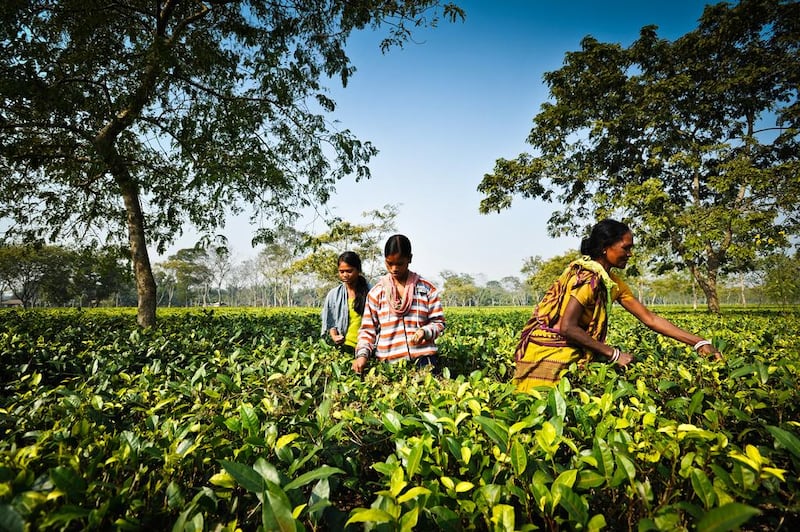Rajanti Tanti was picking tea on the plantation when word reached her that some people were taking her daughter away.
She dropped everything, the leaves spilling out of her bag, and ran to the road. There was Shiboti, 12 years old, being helped into a car by two strangers.
“Stop!” Rajanti screamed, but they carried on. “Don’t worry,” they told her, “we will look after her.” And then the car was gone and Rajanti was alone.
“I started to cry, all day I cried,” she says, and there are tears in her eyes again now, a year later. “I could not eat. All week, all month, I was just like a mad person. I could do nothing.”
Rajanti could not be certain, but she suspected she knew where Shiboti had gone. It was not the first time strangers had spirited a girl away from the vast tea plantation in the north-eastern Indian state of Assam.
But the knowledge was no comfort. The people who had taken her daughter were 21st-century slave traders and Shiboti was on her way to Delhi to be sold into domestic servitude as a maid.
“After that only once she called. I asked: ‘Where are you?’ She said: ‘I’m OK’ and the phone cut.”
Rajanti looks down at the creased and stained picture of Shiboti that she holds in her hands. The girl beams back at her, confident and pretty in a beautiful purple kurta. Rajanti fears Shiboti is lost forever. But even as the tears run down her face, there are people hatching a plan to find her daughter. The hunt is on.
India has a problem with slavery, a very serious problem that rarely seems to merit discussion. The Global Slavery Index estimates that India is home to half of the world’s modern slaves. More than 100,000 young people are believed to be working in conditions of domestic slavery in Delhi alone. They are tricked into leaving their homes with promises of a better life in the capital, only to be sold to placement agencies who sell them on again to families. The stories they tell are of unimaginable abuse: rape, beatings, imprisonment and a life of penury.
Part of India’s problem is the rise of its middle class, who demand servants to ease their busy lives.
“I don’t think these people who engage them as domestic slaves ever think of it, they have a different mindset, they think they were born to take work from the poor people, sometimes the poor people think they were born to work for them,” says Kailash Satyarthi.
Satyarthi is the founder of BBA – Bachpan Bachao Andolan (Save the Childhood Movement), India’s leading child rescue group. In the past two years, it has rescued 2,600 children, but at a high personal cost. Two of its members have been killed and most of the others have tales to tell of beatings.
He and his colleagues cluster in the front room of their offices in Delhi, putting the finishing touches to their plan to spring Shiboti from the clutches of the slavers. Working with a team from Guardian Films, they have taken four months to track her from Assam, more than 1,600 kilometres away, to a house in Delhi. She is one of at least 14 girls missing from the estate.
The plan is to bring some of the parents to Delhi to try to reunite them with their daughters. It is enormously difficult: Delhi is a city of 16 million people and tracking down even one girl missing for so long is an almost impossible task. But they are determined to try.
It is the morning of the first Monday in January when the parents board a train for Delhi. It will take the best part of two days to reach the national capital. Shiboti’s father, Shomna, sits staring forlornly out of the window, watching India roll by.
He had been working away when Shiboti was taken, trying to earn more money to send her to school, determined that his daughter would escape a life of poverty.
“I wanted to know my daughter was safe with her future, I wanted to provide her with an education, to make her independent,” he says.
Shiboti was born on a plantation owned by an international business and financial consortium but while the owners count their fortunes in billions of pounds, the local tea workers, including those picking for major international tea brands, earn a basic cash wage of 94 Indian rupees a day (Dh5.6). If that seems a small amount of money, it is. The legal minimum wage for Assam is 169 rupees for an unskilled worker. But tea is big business and the estate owners have struck a deal to top up the wage with benefits in kind such as free tea and schools for workers’ children. Their critics say many of these are statutory benefits that should not be counted and that in paying such a low cash wage, they have created a fertile breeding ground for the modern slave trade.
Like Shomna Tanti, Ramesh Tanti (no relation) was determined his daughter Somila would escape such a fate. She was one of the brighter girls in her class and Ramesh had scrimped and saved to pay for her to take computer lessons in the hope that she could leave the plantation. “My whole life I kept on plucking the plantation work, but I didn’t want that my daughter should do it, so I thought that if she studies well she can have a decent future. I was very concerned about her future,” he says.
Somila was 16 when the trafficker came calling three years ago. He was very persuasive. He filled Somila’s head with stories of Delhi and the better life she could have there.
“Two days before my daughter has been kidnapped this agent the trafficker came and gave her a lot of tempting ideas that if you go with me you will be happy, things like that,” says Ramesh. By the time the family realised what was happening, Somila was gone.
“My heart has been burning, it got broken many a times, but being a man I tried to keep my tears inside so I was completely broken but did not want to cry in front of others,” he says. His eyes are red and he looks away. The train rolls on to Delhi.
The other parents tell their own stories of loss. Laxmi Munda was 12 when she disappeared. The local trafficker Deepak had been to the family’s home the day before to talk to her parents Mangoal and Susena, but they did not really understand what was happening. The next day, she was gone, along with several other girls from the local area. “She was a trusting person. Maybe he promised her a better job so that’s why she believed him and she went with the other girls,” says Susena.
Rekha Munda was taken when she was just 11. No one has seen her since. Sisters Sunita Tanti, 17, and Anita, 13, were picked off by the traffickers two years ago. “If I saw them I would say they are pimps, they are not men, they are pimps,” says their grandfather Sadan Tanti bitterly.
The first raid, two days later, is a success – and a failure. The target is a placement agency in the Shivaji Park area of Delhi. The team pulls up outside a three-storey building in a busy, down-at-heel street. On the roof terrace a group of girls start to run in panic as the police and rescuers enter the building.
They find some girls in an office with mattresses on the floor and locked filing cabinets containing false documents. More documents are found inside a bed, books and false papers. Thirteen children are free, nine girls and four boys. But neither Shiboti, Somila, Laxmi nor Rekha are there.
The next morning the team regroups. They are thrashing out the details for two more raids when a phone starts ringing.
It is Somila. Her owners are threatening to sell her into prostitution in Mumbai. She is afraid she will be lost forever. “Help me,” she pleads.
Everyone dashes to the cars. But Somila cannot tell them where she is. All they have to work on is the address of the agent who brought her to Delhi. They set off, heading west.
Inside the car, the phone is ringing again. It is Somila, frightened and confused. “She is frightened of the trafficker,” says Satyarthi. “She is frightened that they will kill her family. “Her world view is so limited that she believes the slave master is the super boss, the centre of power, that he can do anything,” he says.
The phone is handed to Ramesh, Somila’s father, crouching in the back of the car. A neighbour is trying to help. Finally, they manage to work out where she is. The car turns north and accelerates.
It is a typical middle-class Delhi street. The salmon-pink house, three storeys high with ornate balustrades, sits behind a large metal gate. A woman on the first floor is hanging out clothes on the balcony.
Out of the cars, hammering on the gate, then into the house. The owner stands in the middle of the room, looking bewildered. Does she have a maid? Yes. Then call her. Time stops. And then there she is, a small figure, emerging from the darkness of the back room through silver curtains draped across an archway, taking off her apron, a smile spreading across her face.
“Are you Somila Tanti from Sonitpur?” She nods. “Then you are free.”
She is led outside to where her father is waiting. He throws his arms around her, wails his joy. There is what seems like an eternity of tears, the pair clinging together. He is so overcome it seems like he might collapse. Satyarthi forces him to take water from a plastic bottle and he gulps at it hungrily, head tilted back, rivulets running down his face.
A little while later, everyone is back inside the house. The police have called Sanjay, the trafficker, and told him to come. He arrives on a motorbike, a worried man. They sit him on the sofa, take away his phone and his bike keys and start to ask him questions.
The couple who bought Somila from him for Dh1,500 look on, baffled, unable to understand what they have done wrong. They paid him 4,000 rupees (Dh240) a month in wages for Somila, they say, though she never saw a penny.
Sanjay is led away. Later he will confess to taking 18 girls and will be charged with trafficking and abduction. He will not be granted bail.
On the pavement outside the house Shomna Tanti watches him go. He is happy for his friend, but there is no mistaking the pain in his eyes. There is no word on Shiboti.
Somila sits on the hard concrete step of the police station, waiting to make her statement. “I had a deep feeling in my heart that one day my father would come to search for me. But I could not expect this thing today,” she says.
The traffickers had tricked her into leaving, she says. “I was tempted with a decent job and I was told that since I am a little bit educated I will find a good job in an office or at a shop, so come with us and you will earn good money and we were poor so I thought it would be good.”
Instead, she found herself unable to escape, sold to owner after owner.
“I was abused badly at the second place, this man was very bad, he used to touch me and try to rape me and I was very angry with nowhere to go and I did not want to stay there,” she says.
She wants to return to her studies, to be a nurse, she says. And she wants the people who took her to be punished. “They should realise that they cannot separate daughters from their parents and make us fool. They speak lie and make us fool. They cheat us.”
A week after Somila is freed, the BBA team springs Shiboti from the house where she is working. They arrive at night and there is a protracted argument with her owner before the girl is handed over.
As she bundles up her few possessions, she shows them where she sleeps, on the floor in a stairwell.
She had been tempted by the idea of earning more money, she says later. She was sent first to Punjab, then to Delhi. The agency kept all her wages and refused to let her go home. “My employer’s wife always used to taunt me by saying: ‘I’ve bought you for 30,000 rupees, so do as I say’,” she says. “My employer’s wife used to beat me for every small mistake I made or even without any mistake.
“I used to work for longer hours and she used to make me wash the whole premises every day. She even threatened me that she’ll send me to jail by making false complaints.”
She glances at her relieved father. “I still can’t believe that I am with my family and escaped from that hell.”
Three days later, another girl, Rekha Munda, is freed. It is the final raid. In total 20 girls and boys are free as a result of the investigation.
Yet there are tens of thousands like them, still working, unable to escape. Between 2008 and 2012, 452,679 cases of child trafficking for domestic labour were reported in India. Just 3,394 – 0.6 per cent – of those reports led to convictions.
Kailash Satyarthi says the tea companies must shoulder some of the blame. “The owners of these international tea estates don’t care for these people, they don’t pay them minimum wages, forget about the decent wages, they don’t pay the survival wages even.”
The companies make their profits, he says, and the corrupt politicians and police take their cut, and the poor are left hoping that the traffickers’ promises of a better life somewhere else are true. But they never are. “The reality is slavery, the reality is abuse, the reality is a kind of sexual exploitation, the reality is endless slavery.”
Gethin Chamberlain is a photojournalist based in South India.
The Guardian films documentary can be viewed here





